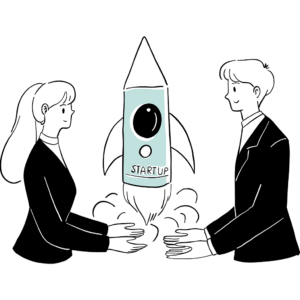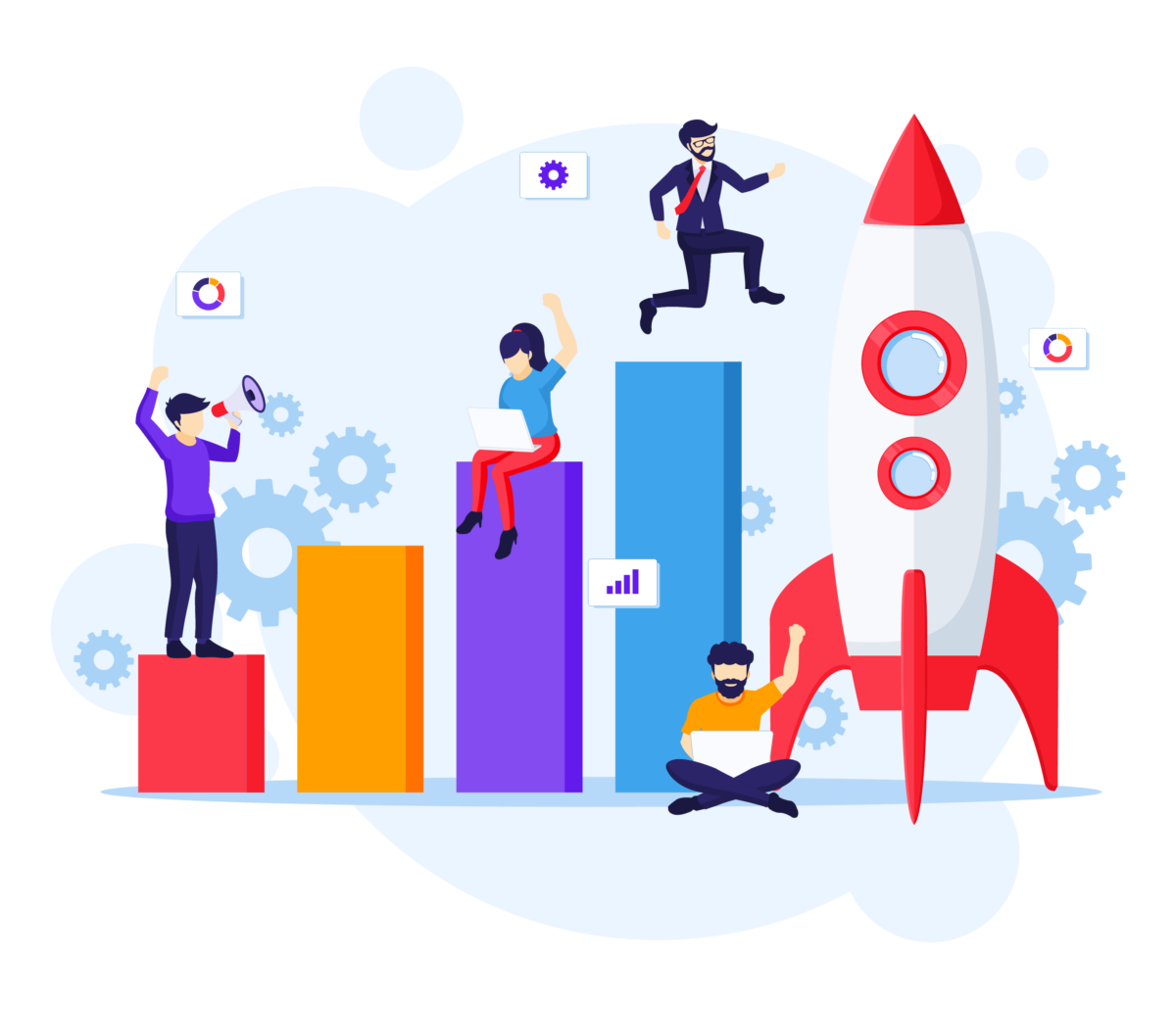Ever since we started doing webinars and workshops on Data Science, there is always at least one person in the crowd that asks us this,
How much does a data scientist earn in Malaysia?
This is a fair question, especially if you are looking to venture into a data science career.
1. Junior Data Scientist
Salary range: RM 2,250–RM 4,462 per month.
As a junior data scientist, the basic skills you need are SQL and basic Python programming.
Your job is to assist senior data scientists with their daily tasks.
For data preparation, you need to collect and clean the data, making sure that the data is of good quality and ready for use in analytics projects.
After that, you will assist in building machine learning models, assessing performance, and using these models to answer business questions.
Lastly, junior data scientists will need to prepare a report on the results and share it with the team.
2. Data Scientist
Salary range: RM 4,800 – RM 7,500 per month.
Data scientists with 2 – 3 years of experience take on more responsibilities.
Their main job is to perform statistical analysis to uncover insights and to find trends and patterns.
Their salary varies, depending on location, industry, company size, and technical expertise.
You will get a higher-paying job in areas such as computer vision, natural language processing, and deep learning.
Experienced data scientists also develop machine learning models for predictive and prescriptive analytics.
Finally, they communicate the key findings with stakeholders to make informed business decisions.
3. Data Team Lead
Salary range: RM 6,100 – RM 8,800 per month.
The main role of a data team lead is to lead a group of data professionals.
This group consists of data engineers, data analysts, machine learning engineers, and data scientists.
They work together to solve business problems.
The data team lead’s work will also involve organizing and overseeing data projects.
They will make plans, gather requirements, and execute and deploy the project.
Your salary varies depending on the team size, responsibilities, and nature of your work. Whether it is more on leadership, technical, or balanced.
You are required to decide the tech stack, create road maps, and set goals to improve data analytics capabilities continously.
Since the data team lead is a leadership role, you will also need to hire and mentor team members, making sure their career development is aligned with the company’s growth.
4. Chief Data Scientist
Salary range: RM 10,800 – RM 21,600.
As a chief data scientist, you will work together with other C-level management like CEO, CTO, and CFO.
Your role is to lead a data team and drive a data strategy that aligns with the company’s goals.
Sometimes the position might not be called chief data scientist.
You could be the Vice President (VP), Director of Data, or CIO.
But, their jobs are all similar.
A chief data scientist’s work is less technical. As you gain experience and management skills, your pay will match what you bring to the company.
Some companies (e.g., funded startups) even pay up to RM 100,000 per month if you can deliver value.
What about the salary of other data roles?
When we talk about careers in data, it’s not just data scientists who are in the spotlight.
There are several other roles that play a crucial part in a data team, each with its unique roles and, of course, salary scales.
Data analysts
Salary range: RM 3,600 to RM 5,800 per month (Jobstreet)
Data analysts are people who turn data into insights.
They usually work with existing data, using tools like Excel or SQL to analyze and report findings.
Data analysts are crucial in helping businesses understand their performance and make informed decisions.
Data engineers
Salary range: RM 5,400 to RM 7,400 per month (Jobstreet)
Data engineers are the builders in the data world.
They design, architect, and construct systems that gather, manage, and store raw data safely.
They work closely with big data technologies and cloud technologies, and are often proficient in scripting languages like Python and SQL.
Due to their technical expertise, data engineers often come from database admin or network engineers background.
Machine learning engineers
Salary range: RM 4,649 – RM 8,154 per month (Indeed)
ML engineers focus on using algorithms to build models that allow machines to learn and make predictions.
Their work is more specialized compared to data scientists, and as a result, they often command higher salaries.
They are the wizards behind the intelligent systems that power a wide range of applications, from product recommendation to self-driving cars.
Job demand for data scientists in Malaysia

Data science is still one of the most highly in-demand skills moving into 2024.
This trend is still growing.
But, Malaysia is still short of data scientist and other data professionals.
The main reason is the growth of AI and IoT development, which generated exponential volume of data.
Scroll through any job portal, and you’ll find many vacant data roles.
Also,data science skills are applicable across different sectors and industries.
So, whether you’re in finance, logistics, the property sector, etc., learning data science skills will certainly accelerate your career growth.
Should you work for startups or corporates?

Want to make a big difference in the world? Joining a startup is a great choice.
You’ll work on cool, new products, and tackle tough problems.
Data scientists often get paid more at startups, especially the ones with funding. Because startups are always in a hurry, looking for skilled people to join and speed things up.
In the case where the pay is lower, startups might offer other perks like equity.
They also give you more chances to grow your career compared to big companies.
If you are a mid-career and want a more laid-back life, then a big company might be better. Big companies are more structured, and you don’t have to firefight every moment.
Working in big companies is less liberal than in startups. But you will learn about systems and work in a different kind of place.
Big companies make it easier to balance work and life. With team support, it’s easier to take time off for yourself and your family.
Conclusion
Data science is a life-long learning journey.
As new and emerging technologies evolve, your career will become valuable and lucrative as you venture into another field with your newfound knowledge and skill.
Whether you’re just starting in your career, trying to switch to data science or becoming a data professional, learn the basics – the skillsets and industry knowledge to succeed that you can apply at work.
Not to forget the open-source tools that are available which is part of a data scientist toolbox!
We hope this article has helped you gain a better understanding of the career prospect of becoming a data scientist.
If you think data science is what you are passionate about, you can read more about how to break into data science with no technical background or join our Data Science 360 course to kickstart your data science journey.
What other data science questions would you like us to answer?
Let us know in the comments section below. Like us on Facebook and subscribe to our Youtube channel for more content like this.



Your article should be dated. Information for the field is time sensitive. If the information give here is 3 years old. It may not be valid anymore.
Good point. Check out the date above. 🙂
Hi, may I know which country and universities are famous for this course?
It depends on the focus of the data science degree you are looking for. Some data science programs focus more on the comp science part, and some focus more on the analytics and maths part. I find that most of the good programs are offered in UK and US, for example, MIT, CMU and LSE offered Master programs with a good balance in technical and theory.
I’m from a healthcare background. Did not really find something to specialise in so my job is mostly quality and operations. Would it be wise for me to go into this field to be employed? Also am I considered a fresh grad and getting a fresh grad salary despite my past experience?
Hi Mei, certainly. Data Science is about using code to build mathematics and statistical models in a scalable fashion, and apply it to industry problems. In fact, domain knowledge is the key and your unfair advantage, especially healthcare is such a hot field right now.
Another misconception is the fresh grad part. No, you should never consider yourself a fresh grad. Your past experience is useful, you are an experienced team member with new skills, how do you think that sounds?
How do I choose between math based and comp sc based data science degree?
Hi Baoee,
Maths based data science degrees focus more on the fundamentals, statistical modelling, calculus, and etc. Whereas comp science based ds degrees focus more on the algorithms, and other computer subjects e.g. networking, operating systems, and computer architectures. Which one are you interested in?
Any idea on how is the masters of data science and analytics offered by USM and masters of data science offered by UM? Thanks in advance.
What I like about both degrees are:
– Programming for data science
– Machine Learning for Data Science
What I like about USM:
– Multimodal IR
– Data visualization and visual analytics
– Text and speech analytics
What I like about UM
– Research methodology
– Data mining
Both universities are teaching Big Data, which is good to have but not so applicable in the industry and research field. On the technical side, Hadoop is a good technology, but the adoption rate in Malaysia is super low. Which means you have a slim chance of getting a job afterwards.
Both universities also do not cover much on data engineering and even the foundation of data science. it is due to the design of the course and they can’t cover that many topics.
Most data science graduates focus too much on the data analytics part and neglect other important aspects. You should look into these areas for example unstructured data, text mining (includes topic detection, sentiment analysis), and multimodal IR (how to combine text, audio and video)
Other factors you might want to consider while selecting between these two universities are their industry connection and facilities. Most data science services are cloud-based today, except for deep learning that requires GPU. A university that provides better facility will also be a plus point.
Hi Dr Lau,
That’s a good insight. As costs is my biggest constraint, I can only choose local uni to do Masters in Data Science. Which university would you recommend?
For local universities, I quite like UM and UTM for their course structure, alumni network, and also their facilities. Maybe you can share with me what is your career goal such as the role and industry you want to be in, and also some of your current findings for local data science programs? Then I can point you in the right direction.
Hi Dr.Lau,
What do you think about studying abroad for Data Science related course, such as studying in Singapore? Is the degree more valuable as compared to studying locally in Malaysia? Would be grateful if you could provide the pros and cons for both overseas and local studies.
Thank you in advance.
As long as you can afford, it would be best if you studied abroad. When you study oversea, you get to mix with the locals, learn how they work, experience their culture. I studied Diploma in Singapore for 3 years and worked for 3 years before I further study in Australia, it was a great experience.
We can evaluate the degree base on course structure and the university QS ranking. The course structure is somewhat similar. Let’s compare Data Science And Analytics by (NUS) vs Bachelor of Computer Science (data science) by UM. Both cover the introduction to data science, mathematics, statistics, data structure, database design. Both also offer electives on business, networking, and some advanced topics.
Both NUS and UM are recognised globally so you won’t have a problem further study in Master or PhD. Ranking wise NUS is higher and is in the top 1% of world universities. But data scientist is still highly in-demand, and employers assess your skills first.
There aren’t any obvious cons studying in Singapore. Their school fee is reasonable and international students can apply for a tuition grant. Some might say the living cost is expensive because of the currency, but you can make it up with part-time jobs.
The only downside studying in Singapore is that their people, culture, environment are like Malaysia. You might want to explore studying in Australia? I can provide some information if you need further details.
Hi Dr Lau,
Which private universities do you recommend for Data Science degree programme?
a) Monash University – Bachelor of Computer Science in Data Science
b) Heriot-Watt University – Bachelor of Science (Hons) in Statistical Data Science
c) Asia Pacific University (APU) – Bachelor of Science (Hons) in Computer Science with a specialism in Data Analytics
d) Taylor’s University – Bachelor of Computer Science (Hons) with a specialism in Data Science
Hi Dr Lau ,May I ask if you recommend to study statistical data science in the university of Heriotwatt Malaysia?
Hi Chloe,
It depends on your career path. This degree suits someone who wants to become a data analyst. In particular areas like finance, banking, and insurance. Because many of the subjects focus on financial mathematics and actuarial science.
If you take a closer look at their electives are also related to finance. E.g. finance reporting, portfolio theories, and derivative markets. For the same reason, this course will lay a foundation if you plan to work as a researcher, quant, or pursue a Masters or PhD. degree.
This degree doesn’t cover typical subjects such as Python programming, data structure, algorithms, database designs, and SQL. You might want to consider other degree programs if you are looking for a more technical career path: E.g. data scientist, big data analyst, machine learning engineer, or AI developer.
Thanks for the beneficial insight. What do you think of the course Bachelor Hons in Data Analytics at Asia Pacific University, Malaysia? Does the syllabus cover the important aspects needed for this career?
Hi Leyla,
You may refer to this video for more details: https://youtu.be/BpEj0wRsy7s
Do let me know if you have any further questions 🙂
Hi, for USM elective courses: among business analytics elective and multimodal analytics elective, which one do you recommend?
Business analytics consists of Consumers Behavioural & Social Media Analytics, Business Intelligence & Decision Analytics, Predictive Business Analytics.
Multimodal analytics consists of Multimodal Information Retrieval, Text & Speech Analytics and Forensic Analytics & Digital Investigations.
Thanks in advance.
Hi Ching,
It depends on your career goal. Business analytics is generally more applicable. Most data analyst jobs require BI and predictive analytics. Consumers behavioural and social media analytics are handy in most customer-oriented industries. E.g. retail and e-commerce.
I chose multimodal analytics during my uni time because I am interested in forensic. Also I like to learn how to analyze structured data since I was already pretty well-versed in software development at that time.
Hi Dr. Lau
I would like to ask which university in Malaysia do you recommend for Master data science programme?
Personally, I wish to learn more on analytics and modeling.
Thanks in advance.
Hi Christina,
Have you shortlisted any universities? Let me know the top 3 in your mind and I will be able to guide you. It is rather hard to prescribe a single on given that they all have its own pros and cons. You may also refer to this video for some guidance. https://youtu.be/BpEj0wRsy7s
Hi Dr.Lau, is there a doctoral program in UTAR Kampar for data science? If yes, what is the entry requirement? Is it enough to have degree in mathematics science (Statistics) with a MBA?
Hai, considering Data Science for my degree this year. Not sure what is written for me in the future. Maybe answering some questions in my head will help me put myself to ease
So, some of my questions are
-Where can I apply for careers with a Data science degree
-Is it appropriate to study for masters and PhD right after degree in Data Science, will that help me in securing a career?
-Is Data science in high demand in 3-5 years from now?
1. Most companies are looking to hire data science professionals, from data engineers, data analysts, to data scientists. They advertise on their company career page or job portals.
2. A master or PhD is not required to secure a data science job unless you want to venture into academic research.
3. Do you think we will have more data in the next 3-5 years from now? That is your answer 🙂
Hi Dr Lau, TARUC is offering Computer Science Degree In Data Science since 2019. Do you recommend me to enrol to the course and what are the thoughts from you? Below are their programme outline
Introduction to Computer Systems
Web Design and Development
Software Engineering
Internet of Things
Introduction to Computer Networks
Data Science
Statistics for Data Science
Artificial Intelligence
Machine Learning
Data Engineering
Business Intelligence
Data Warehouse Technology
Cloud Computing
Problem Solving and Programming
Database Management
Advanced Database Management
Object-Oriented Programming
Research Methods
Data Structures and Algorithms
Social and Professional Issues
Probability and Statistics
Discrete Mathematics
Project I
Project II
Industrial Training (6 months)
Electives (Choose 3):
Introduction to Computer Security
Mobile Application Development
Natural Language Processing
Graphics Programming
Image Processing
Algebra and Calculus
Music Appreciation
Introduction to Short Story
Free Module Electives (Choose 1):
Business Organization and Management
Principle of Marketing
Hi Oscar,
Have you watched this video https://www.youtube.com/watch?v=BpEj0wRsy7s ?
If you have, I got two questions for you:
– What is your career goal / plans?
– If you have not decided, at least tell me what are your interest area, that will help to provide relevant input for your questions.
Cheers!
Hi Dr Lau,
I have definitely watched your video. Data Scientist will be my first career option, follow by Data Analysts. FYI, I am finding tertiary education for Data Science. I am just getting trouble what university that suit me. For now, APU and TARUC are under my consideration. I would like to ask you which university will you recommend me more. Thanks for your comment!
Btw, this was the syllabus that TARUC lecturer gave me
Basic and inferential Statistics
Mathematical concepts (linear algebra and multivariate calculus)
Classical Machine Learning (supervised and unsupervised)
Artificial Intelligence (Deep Learning that involves neural networks)
Visualization and Reporting (using Tableau, QlikView, etc.)
Big Data Storage (using Hadoop, Hive, etc.)
Databases (Relational: SQL, MongoDB, Non-Relational: NoSQL, etc.)
Machine Learning on Cloud (AWS, Azure, etc.)
Analytical tools (R, Python, Apache Spark, SAS, etc.)
Real-Time Data Handling (Apache Kafka, Amazon Kinesis, Flink, etc.)
Data Science Project Management Method (CRISP-DM)
Hi Dr. Lau,
I’m considering pursuing my postgraduate study in Data Science. I have done some research and highlighted these two universities under my consideration. Those are:
1. UM- Master of Data Science (Coursework)
2. Asia Pacific University- MSc in Data Science and Business Analytics
Which one do you think is better in terms of the course structure that I can benefit the most once I graduated? As for my career-path concern, I’d like to navigate my path into data science.
A little bit on my background:
Recent graduate in Bachelor of Economics (Honours) – 2021
Equipped predictive analysis for Business and Economics Forecasting – R programming
Could you advise me on this matter? Thank you so much.
Hii , I’m thinking of studying a degree computer science in data science in Monash university malaysia.
Do you think it’s good to study there in terms of the course ?
Once I graduate will it be easy to look for a job in Malaysia ?
Hi Denise,
You may refer to this guide on how to choose a university for your data science degree. In general Monash is ok, but you need to check if their curriculum matches your career goals. If you graduate on time, there should still be increasing number of job opportunities from now till 2025.
Hi Dr.Lau, is there a doctoral program in UTAR Kampar for data science? If yes, what is the entry requirement? Is it enough to have degree in mathematics science (Statistics) with a MBA?
Hi Keng Fui,
Yes there is. Your bachelor and Master’s degree should be sufficient (subject to your CGPA). You may look into their PhD in Science or Computer Science. Also try to search for the lecturers who are accepting PhD students and look at their research directions. That will help you in the process when you are proposing your research and thesis title.
Hi Dr. Lau, I’m currently considering taking Data Science as a second or possibly switch-to Major at WMU (Michigan) but looking at the course structure, it is a 45 credit hour major. I’m a little skeptical about the content of their syllabus (listed below). I would like to become a Data Scientist working with researchers in the medical or astrophysics field mostly. Do you have any advice?
Core:
Elementary Linear Algebra
R Programming for Data Science
Storage, Retrieval, and Processing of Big Data
Machine Learning
Software Systems Development I: Requirements & Design
Satisfies Baccalaureate Level Writing Requirement
Software Systems Development II: Implementation, Testing
Data Analysis Using R
Introduction to Mathematical Statistics Using R
Introduction to Statistical Computing
Regression Analysis
Big Data Analysis Using Python
Optional:
Applied Data Mining
Appl Multivariate Stat Method
Nonparametric Stat Methods
Time Series Analysis
Stat Design/Analysis Exper
Computer Based Data Analysis
Graphical User Interface Dev
Intro to Web Technologies
A.I
Computer Security & Info Assurance
Computer Networks
Design of User Interfaces
Artificial Neural Sys
Parallel Computations
Comp Modelling/Simulation
Database Systems
Database Mgmt Systems
Hi Michael,
You can take a look at this post https://thelead.io/data-science/how-to-choose-a-data-science-degree-in-malaysia-2021 and use the criteria I’ve mentioned to cross check. Some of the subjects look interesting, but do make sure they are still offered and matches your career plan.
Hi, I was wondering what was the base salary a foreigner from EU with a master’s degree in NLP could ask when applying for a Data Scientist position in Malaysia ? Do you think the market in KL has opened more to foreigners ? Is it easy to get sponsored for a work visa as a fresh graduate ? Thank you.
Hi Sam, it’s not so much about your degree, it’s more about the company. What are the problems they are solving, what type of talent they are looking for, etc? Typically data scientists in KL gets paid around RM 5,000 – RM 7,000. More companies are looking to hire and expand after 1st May, and KL definitely has more opportunities compared to other states. May I know what is your bachelor degree and do you have any work experience prior to this?
hire and expand after 1st May” Dr Lau, why after May?